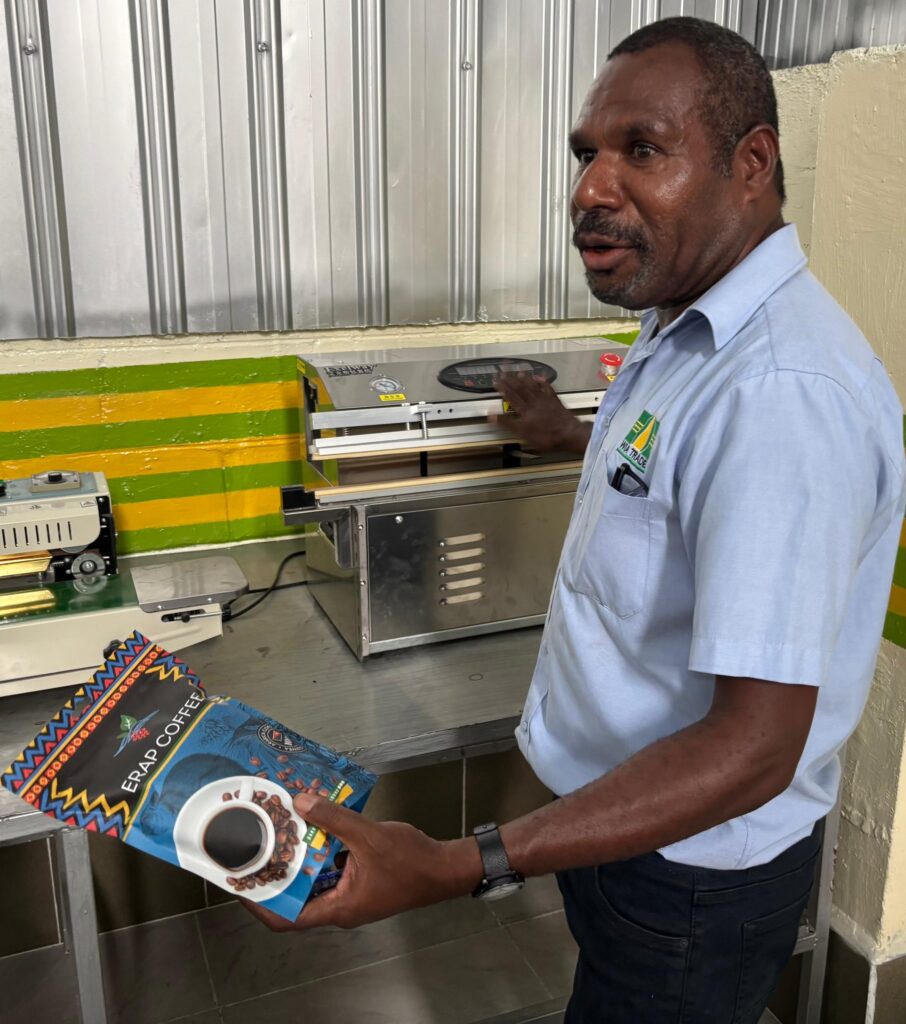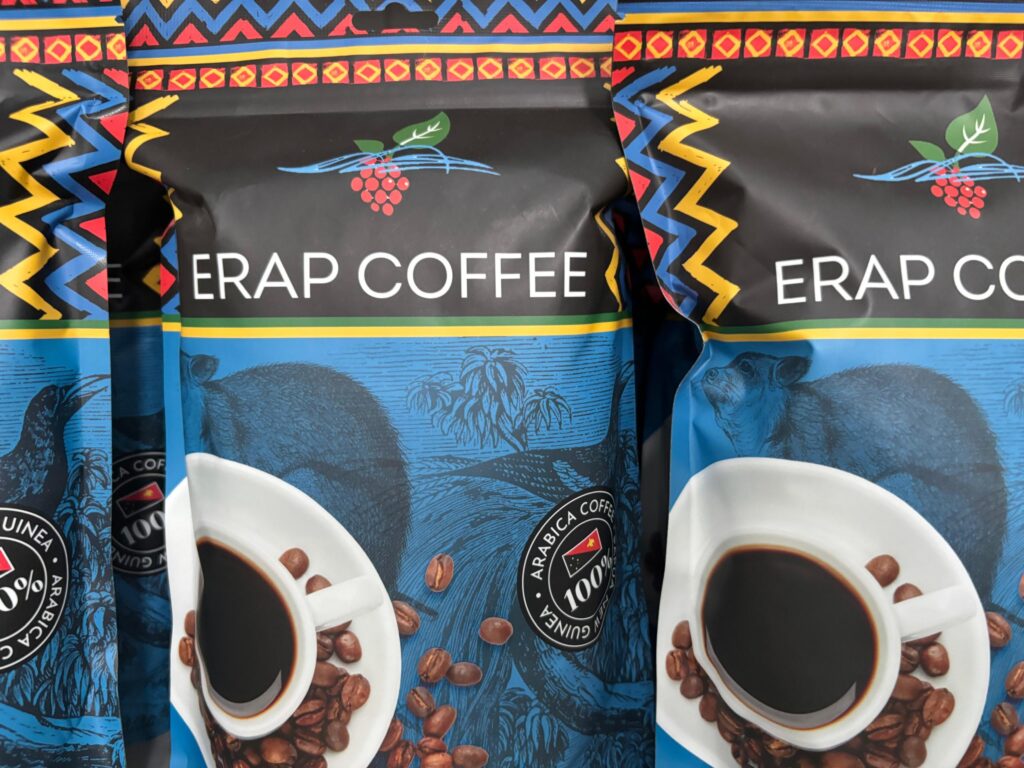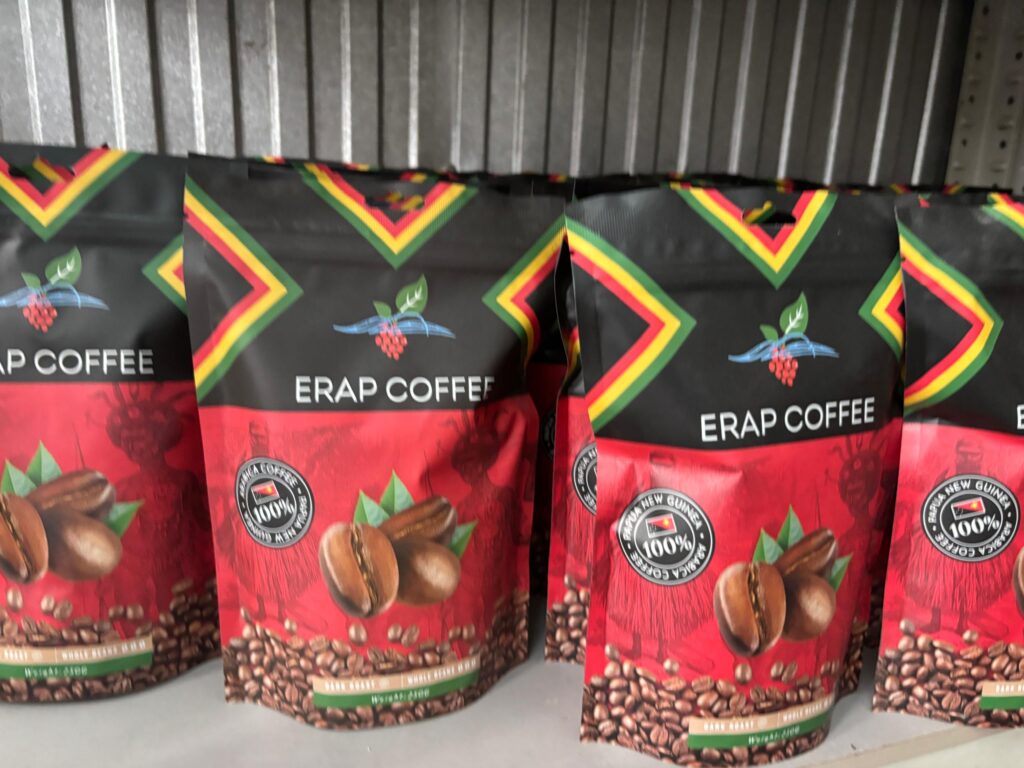Nadzab, Morobe Province | Saturday, May 17, 2025 — More than K7.8 million has been directly paid into the pockets of rural coffee farmers in Morobe Province through Wia Trade, a proudly Papua New Guinean-owned company led by entrepreneur Dr Joel Waramboi, who is now spearheading the development of the country’s first locally owned instant coffee factory.
Speaking during a site visit on Saturday, May 17, 2025, by a delegation from the World Bank, Coffee Industry Corporation Ltd (CICL), PNG Agriculture Commercialization and Diversification (PACD) Project and national government departments, Dr Waramboi said the payments were made possible since exporting in 2020 through project support since 2016 under the former Productive Partnerships in Agriculture Project (PPAP) and current PACD initiatives. Wia Trade is currently supported by the PNG Government and World Bank-supported CICL-PACD Project through its matching grant component with K360,000.
“This is not about me, or my family, or Wia Trade. This is about the farmers — our people. More than K7.8 million has gone directly into their pockets. That is the real impact of these investments,” Dr Waramboi said.
He announced that construction of PNG’s first fully nationally owned and automated instant coffee production facility is now in its final stages, with state-of-the-art technology covering the entire process from evaporation and concentration to spray drying and packaging.
“This is a dream long in the making. The machine is ready, and installation will begin soon. We are not just talking about processing — we are talking about value addition, job creation, and national pride,” he said. “This factory will be the first of its kind in PNG — not foreign-owned, but owned by Papua New Guineans, for Papua New Guineans.”
Driving Economic and Social Change
Since its humble beginnings nearly a decade ago, Wia Trade has grown into a major player in PNG’s coffee sector, exporting 60 containers of coffee to international markets between July 2020 and today, valued at K10.84 million. Of this, an estimated 70 percent — over K7.8 million — went back to smallholder growers.
“These are unseen benefits. You won’t see them like a new road or building, but they go straight to the people,” Dr Waramboi explained. “We employ local staff, pay wages, cover operating costs, invest in infrastructure — all of this from coffee.”
Wia Trade has also embraced digital transformation, eliminating paperwork and establishing a 24/7 ICT-based tracking and monitoring system. Coffee deliveries, exports, and storage are now fully recorded and traceable.

CICL-PACD Commends Local Ownership and Vision
CICL-PACD Project Manager Potaisa Hombunaka, who oversaw support for Wia Trade since its early days, praised Dr Waramboi’s progress from smallholder engagement to full-scale export and downstream processing.
“He started with producing plastic bags, but his investment was lost due to banning of plastic bags,” said Hombunaka. “With PPAP support and his own technical skills, he became an exporter in 2020. Now he’s establishing the country’s first nationally owned instant coffee facility. This is what real downstream processing looks like.”
Hombunaka emphasised the wider impact of such transformation, noting that downstream processing can more than double the value of raw coffee — raising the price paid to growers from K10–K12 to as high as K20 per kilogram of parchment coffee.
“Wia Trade is not just talking — they’re doing. They are strategically located, and processed coffee from here can reach Melbourne in under six hours,” he said. “This is a real-time model Papua New Guinea can be proud of.”
World Bank Backs National-Led Coffee Transformation
World Bank PACD Task Team Leader Allan Oliver expressed strong support for Wia Trade, describing the company as a model for SME leadership and inclusive growth.
“Dr Waramboi, you’ve done so much — and it’s inspiring to see that you’ve actually delivered on the dream you shared with us,” said Oliver. “You told us about the water plant and instant coffee ambitions, and now I’ve seen the machines with my own eyes.”
Oliver commended the vision and execution behind Wia Trade’s growth, noting it was more than just a coffee business.
“This is a sophisticated operation, driven by local leadership with a clear strategy. From cocoa to coffee and now instant production, this SME shows what’s possible when you combine technical know-how with a people-first vision,” he said. “The World Bank is proud to be associated with you. You’re demonstrating to government, donors, and your farmers that change is possible — and already happening.”
He also acknowledged the role of family leadership and community impact: “To you and your wife, and to your whole team, congratulations. You are making a difference — and we look forward to seeing the benefits ripple out even further.”
Jobs, Growth, and a Legacy of Ownership
Prior to project support, Wia Trade had 16 staff. Today, it has 24, with 10 more to be added through the instant coffee factory and another 10 through expansion into roasted coffee, cocoa, coconut, and spices.
“These are the kinds of investments that reduce social problems,” Dr Waramboi said. “Instead of young people roaming the streets, they now have jobs and futures.”
Though roasted coffee returns are currently modest — about K22,300 since May last year — the activity is deliberate and targeted, aligned with Wia Trade’s strategy for high-value positioning.


A National Milestone Approaches
Dr Waramboi urged the government and development partners to continue investing in local enterprise and to extend similar support to commodities such as coconut and spices.
“This is the story we must tell in Singapore, New York, Sydney — that Papua New Guineans can build something of value, something lasting,” he said. “And we’re just getting started.”
He concluded by expressing hope that national leaders would witness the landmark opening of the instant coffee facility.
“Once our instant coffee plant is running, we hope to invite the Coffee Minister — or even the Prime Minister — to see this for themselves,” Dr Waramboi said. “It will be a proud moment — not just for Wia Trade, but for Papua New Guinea.”
Government should seriously consider down stream processing for other organic agricultural commodities such as Cocoa.